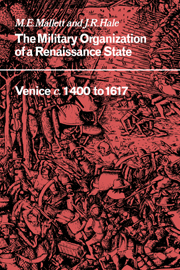Book contents
- Frontmatter
- Contents
- List of illustrations
- Acknowledgements
- References and abbreviations
- Map 1 The Terraferma in the fifteenth and sixteenth centuries
- Map 2 The empire da Mar
- PART I c. 1400 to 1508
- Introduction: the European context 1400–1525
- 1 The beginnings of Venetian expansion
- 2 The composition and role of the army in the fifteenth century
- 3 Military development and fighting potential
- 4 The organization and administration of the Venetian army
- 5 Control and policy making
- 6 Soldiers and the state
- 7 Venice and war
- PART II 1509–1617
- Conclusion: the European context 1525–1617
- Appendix Infantry wages in the sixteenth century
- Select bibliography
- Index
6 - Soldiers and the state
Published online by Cambridge University Press: 22 October 2009
- Frontmatter
- Contents
- List of illustrations
- Acknowledgements
- References and abbreviations
- Map 1 The Terraferma in the fifteenth and sixteenth centuries
- Map 2 The empire da Mar
- PART I c. 1400 to 1508
- Introduction: the European context 1400–1525
- 1 The beginnings of Venetian expansion
- 2 The composition and role of the army in the fifteenth century
- 3 Military development and fighting potential
- 4 The organization and administration of the Venetian army
- 5 Control and policy making
- 6 Soldiers and the state
- 7 Venice and war
- PART II 1509–1617
- Conclusion: the European context 1525–1617
- Appendix Infantry wages in the sixteenth century
- Select bibliography
- Index
Summary
Doge Mocenigo, witnessing the growth of a standing army in the early years of the fifteenth century, warned Venetians on his deathbed of the dangers of becoming vassals of the military. This danger, added to that which had always affected Venetian thinking – the fear that the involvement of individual nobles in military affairs would give those men pretensions and prestige out of keeping with the traditional corporate spirit of the Venetian nobility – led to an official policy designed to keep the army at a distance and firmly under control. In a certain sense, therefore, Venice encouraged a strict separation between the military and civilian spheres, and seemed unaffected by humanist and Machiavellian rhetoric about the dangers of a mercenary system and of such a separation leading to a sapping of the moral fibre of the civilian population. It is this formal sense of separation which has pervaded the preceding chapters. But beneath this lay a whole series of informal links, and indeed what might be described as an implicit policy of integration, which distinguished the Venetian approach to military problems from that of most of the other Italian states, and particularly Florence. The Machiavellian critique was a critique of Florence, and when he himself sought to apply it to Venice he did so on the basis of very little real understanding of the situation in Venice.
Undoubtedly Venice had its problems with soldiers; it suffered its share of treacheries and infidelities; it had cause for complaints about ill discipline and poor service. Nor can it really be said that it achieved notable success with the formal methods of control of such problems and the punishment of offenders.
- Type
- Chapter
- Information
- The Military Organisation of a Renaissance StateVenice c.1400 to 1617, pp. 181 - 198Publisher: Cambridge University PressPrint publication year: 1984



